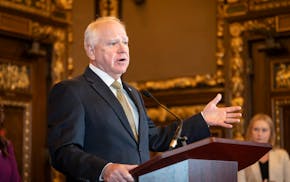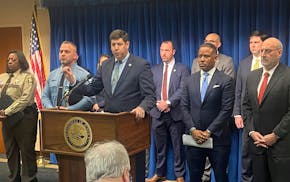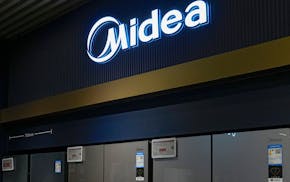PERHAM, MINN. – Outside the sparkling new high school here, no one lingered in the parking lot on one of winter's coldest nights. Inside, though, the Hive was jumping.
This girls basketball game wasn't particularly noteworthy: the Perham Yellowjackets against the Staples-Motley Cardinals with neither team bound for the state tournament. Still, the gym was packed to support their hometown girls. On the second-floor walking track, murals showed the history of the town and star athletes of the past. Senior night was the hottest thing going on a subzero evening in this west-central Minnesota town, especially with junior Kaia Anderson expected to score her 1,000th point.
When Kaia made her landmark basket, officials stopped the game. Kaia hugged her dad, the school's activities director, and gave the game ball to her mom, who'd been diagnosed with cancer the previous year and had become a community rallying point. The crowd, many holding signs that simply said "1000," stood and applauded, some fans with tears in their eyes.
This moment underscored how Perham unlocked the secret recipe for success that has eluded plenty of small towns around Minnesota. Simply put, people who live in Perham support Perham.
They follow the lead of the Nelson family, which has run an array of manufacturing businesses in Perham for three generations. Teenagers graduate, see the world and move back to the town where a huge Perham Yellowjacket logo adorns the water tower. Thriving small businesses line blocks of a bustling Main Street: Brew Ales & Eats pub, MN Tru North sporting goods/lake-life store, Bay Window Quilt Shop, Richter's Men's Wear.
Perhaps most vital has been large, locally owned businesses reinvesting in this town halfway between Brainerd and Fargo on Hwy. 10: internet service provider Arvig, which started here in 1950 as a telephone company and has stayed local while expanding regionally; Bongards, a farmer-owned cheese-making co-op in the midst of a $125 million expansion; and the Nelson family's KLN Family Brands, Perham's leading company. Even if you don't know KLN, you've seen their products: Wiley Wallaby licorice, Tuffy's Pet Foods, Finley's dog treats, Sweet Chaos drizzled popcorn.
The Tuffy's manufacturing plant shadows Main Street, symbolic of KLN Brands' impact in a town of 3,600 people where the company employs some 700. The Nelson family has helped fund scads of big projects in recent decades. The company infuses everything in town — even the air.
"Every other day, the whole town smells like licorice," said Eryn Moser, an elementary educator who was watching the basketball game. She paused, then added: "We also get the dog food smell."
"People say it smells like money," said her friend Ronita Hackel.
A tour of Perham makes it clear that this small town has figured something out in an agriculture-heavy part of Minnesota that has seen plenty of small towns fall on hard times.
In the past quarter century, as some Minnesota small towns have seen stagnation or weak growth, Perham's population has increased by more than 40%. That's a higher rate than the state's overall population growth of 30% and matches the explosive Twin Cities growth during that period.
People here know they're blessed with natural amenities like Otter Tail County's 1,048 lakes, more than any county in America. The lakes pull in vacationers and snowbirds, more than doubling the town's population during summer months.
But a solid tourism economy doesn't fully explain this town's success. There's a $50 million high school that would look right at home in a thriving Twin Cities suburb many times larger than Perham. A state-of-the-art hospital that nearly closed a generation ago but is now a booming part of the community. A historic movie theater in a thriving downtown. A newly refurbished community center, a 27-hole golf course, and ambitions for an outdoor skating rink.
Longtimers point to a less tangible reason for Perham's success.
"We've had people who grew up here, who love living here and who've reinvested in their community," said Fred Sailer, a retired high school activities director and longtime resident. "When you look at the whole western side of Minnesota, there were dynamic little towns all along that North Dakota-South Dakota border, mostly driven by agriculture. As agriculture began to change, you didn't have these 120-acre farms and dairy farms dotting the countryside. When that happened, a lot of small towns died."
Perham's diversified economy, with agriculture, manufacturing and tourism, meant that when one sector struggled, another picked up the slack. And instead of being closed off to newcomers, Perham's old guard has nurtured its next generation of leaders.
"Every small rural town is fragile," Sailer said. "If you don't encourage leadership, new faces, new ideas, your fate is sealed."
Local benefactors spur growth
Many point to the Nelson family's generous spirit. Tuffy Nelson moved to Perham after World War II and started Pine Lakes Feed and Hatchery. Over time, he and his son Kenny happened upon a new business idea: pet food.
The company, a $600 million enterprise drawing employees from a 40-mile radius, is now run by his grandson, Charlie Nelson. The company ethos includes community improvement, and Kenny Nelson points to the late 1980s as a huge moment in Perham, when five wealthy local donors ponied up $50,000 apiece to kickstart fundraising for the Perham Area Community Center, a recreation center that's become the city's crown jewel.
Local benefactors also raised millions for the new hospital and the new school, a new Boys and Girls Club and a new learning center for autistic and other neurodiverse kids. To chip away at the housing shortage, local leaders founded Grow Perham 15 years ago, which now operates more than 300 apartment units, including a new 36-unit complex downtown. Leaders brag about two-bedroom units renting for less than $1,000 a month here.
"We put in good money to get it going, then we rally the troops to get it done," said Kenny Nelson.
Part of it is hometown pride; part of it is smart business. A generation ago, conventional wisdom was that America's small towns had a jobs problem. Now, in the successful ones at least, there's a people problem. The local economic development agency even put up a billboard recently in Thief River Falls, more than 100 miles away, to court Arctic Cat employees to move to Perham after its manufacturing facility closed there.
"We're well known for having more jobs than we have people, so we bring people from all over," said Tim Meehl, Perham's mayor.
For companies like KLN, recruitment is a prime concern. The company invests to make Perham a more attractive place to live. KLN hands out profit-sharing checks, some $27 million over the past five years.
It offers benefits like a medical clinic for KLN employees, where workers and family members get free appointments and have access to more than 300 free medications. It built eight new pickleball courts and hosts weekly pickleball games for employees.
"We aren't as cutthroat of a company as you'd come across in some larger environment," said Charlie Nelson. "We're delicately walking that line between trying to continue to grow but also keeping in mind what's most important, which is taking care of our people. We see firsthand the towns around us going away. It's sad to see. Our community works as well together as any community I've seen. It takes a village to pull off a village."
Forward thinking
Inside the sweet-smelling licorice factory on a recent afternoon, 19 thick ropes of red licorice unspooled on line 4's 200-foot cooling tunnel. Six production lines run 24 hours a day to produce 35,000 pounds of licorice.
Jeff McAllister, who has worked for the company for 35 years, paused from operating the mechanized cooking system to consider what makes this town tick. "Progressive" thinking, he said.
He meant not progressive politics, but progressive as in forward-thinking. It's a word you hear all over Perham.
"Most small towns aren't progressive by nature. They're often like an old church trying to figure it out and hold on," said Robb Moser, who works in recruiting for KLN. "There's something cool about this small town being progressive and truly being a small town. I mean, we have three stoplights!"
On Perham's Main Street, Veronica Marpoe recounted her journey here. She grew up in small-town Missouri. Her husband is from Minnesota. They opened a construction company that remodels lake homes, and Marpoe opened North Pines Market, a home décor workshop and gift shop. It feels like a Hallmark movie here, she said: a picturesque place where people work for the common good.
Marpoe is among Perham's new generation of leaders. With a group of girlfriends, all small-business owners, Marpoe is using the Nelson family playbook and trying to raise $5 million for the hockey rink with a chalet renting skates, cross-country skis and snowshoes.
"It's helping support everybody, and that may be the key to the success of Perham," Marpoe said. "Businesses are very supportive of each other. Our town thrives on the fact we need tourism, we need people coming here, and most of all we need each other."

Accomplished climber, photographer who recently moved from St. Paul missing on mountain

Walz: State had no advance notice of federal raid in Minneapolis

DOGE cuts federal money for upgrades at Velveeta plant in New Ulm

Five members of Minneapolis Highs street gang found guilty of racketeering conspiracy
